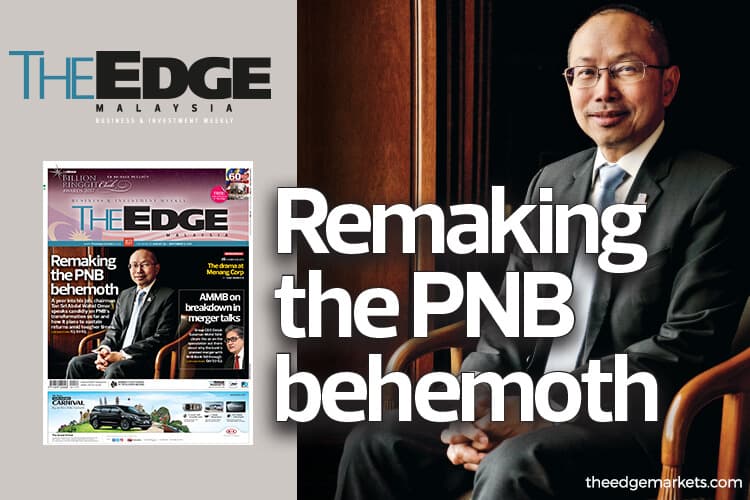
KUALA LUMPUR: It is rare for The Edge Malaysia to feature two cover stories at the same time in one week, like it has done for its publication for the week of Aug 28-Sept 3.
But it isn't every week that Malaysia's largest fund manager Permodalan Nasional Bhd (PNB) is open to talking about its push forward with its massive restructuring at major investee companies in a six-year strategic plan unveiled last year to drive the behemoth forward.
Unceasing speculation and mocking references like the 'runaway bride' that swirled in the aftermath of the failed merger talks between AMMB Holdings Bhd and RHB Bank Bhd also have to be addressed.
In the first cover story titled 'Remaking the PNB behemoth', PNB chairman Tan Sri Abdul Wahid Omar, who was appointed as Permodalan Nasional Bhd chairman on Aug 1 last year, shared that one of the strategies the fund manager intends to employ to boost its returns is by shifting its sizeable 20% or so cash holdings under its RM266.5 billion assets under management — as at Dec 31, 2016 — into high-yield instruments.
“The idea will be to reduce the cash and invest more in private investments, into real estate, and fixed income,” Wahid told The Edge.
He said reducing the proportion to 15% — which would free up some RM13 billion — is a comfortable start. But then again, PNB is not in a hurry to cut its cash holdings, for the right opportunities have to come at the right time. And the eventual reduction could be more, as 15% “is still sizeable by any measure”.
It is looking at potential major acquisitions ahead to add new strategic or core companies to its stable. It defines strategic holdings as companies where it retains the majority shareholding while core entities are where it has 10% stake or RM1 billion in shareholding value.
Among other things, Wahid also quashed talks that PNB is looking to raise new funds to be distributed as dividends.
"There is no such thing. This is not a Ponzi Scheme. As I said, in good times, we create reserves and we don’t distribute all the gains in any particular year. So, we will have those reserves to buffer the payment of dividends during the tough years,” said Wahid.
The point was raised as questions over whether the high dividend at PNB-managed Amanah Saham Bumiputera are real and sustainable have been bandied for some time.
It should be noted that even when the local bellwether FBM KLCI fell 39% year on year in 2008 — and the dividend payout by the Employees Provident Fund (EPF) dropped to 4.5% — ASB’s dividend remained at an envied 7%. Yup, that is 378 basis points above the so-called risk-free-rate or 10-year Malaysian Government Securities of 3.22%.
Well aware of the scepticism, Wahid offered simple logic instead of going on the defensive. “It is a very simple model in the sense that during good times, you don’t pay all the returns. So, we keep some reserves. And during tough times like the past three years, we’ve been realising returns from the unrealised gains. No magic. It’s a very basic model,” he explained.
In the other cover story titled 'Putting out Fires', AMMB group CEO Datuk Sulaiman Mohd Tahir, the principal driver of the bank's merger talks with RHB, insists in an excluside interview with The Edge that there is no truth to suggestions that the no-go was related to potential risks the group faces on issues related to scandal-hit 1Malaysia Development Bhd (1MDB).
He said AMMB felt the terms and conditions of the proposed merger — "it could be valuations, process, systems, [and] people" — were not suitable for the bank.
"As bold as we are in wanting to discuss a potential partnership, it’s also [about being] bold enough to make a call and to say no if we don’t want it. [In the end] both of us decided and said ‘it looks like we’re not such a good fit’, so maybe we’ll move on," he told the weekly.
Asked if perhaps the concern is of a potential liability that may appear in the future, he said: "If I don’t have something on my table now, and nothing that can be quantified, then clearly it’s not a matter for concern. We, as a bank, we always review risk — for example, business continuity, planning for cyberattacks. Would I price in a cyberattack into contingent liabilities? It wouldn’t make sense."
"As far as I’m concerned, as of today, there is nothing on the table [that could be a potential contingent liability]."
To find out more about what Wahid shared, as well as Sulaiman's word-for-word answer to the bald question of whether AMMB has contingent liability exposure relating to 1MDB, pick up a copy of The Edge at newsstands near you today.
P/S: In case you don't already know, The Edge is also available on Apple's AppStore and Androids' Google Play. Alternatively, Subscribe Now.
Save by subscribing to us for your print and/or digital copy.
P/S: The Edge is also available on Apple's AppStore and Androids' Google Play.